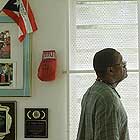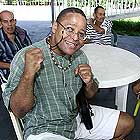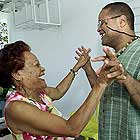|
 |
|
Esta página no está disponible en español. Wilfred Benítez: Ex-Champion Is A Shell Of His Former Self…Thanks For Memories Of 'Radar' Wilfred Benítez: Ex-Champion Is A Shell Of His Former Self By Rick Maese | Sentinel Staff Writer August 11, 2003
TO CONTRIBUTE The Wilfred Benítez Foundation is a nonprofit organization that raises money to help pay for Benítez's care. Donations can be made to: Wilfred Benítez Foundation, P.O. Box 286, Streamwood, IL 60107. Also, Benítez merchandise is available online, with proceeds going directly to the foundation. Visit wilfredbenitez.com for more information. DORADO, Puerto Rico -- Seated in the same chair he always sits in, Wilfred Benítez is lost. "Where are we right now?" He peers out a window and sees the greenery outside. "We're in Puerto Rico," I tell him. He stares ahead and appears to be swallowed in thought. "Oh, Puerto Rico." Then he mumbles something else. "He thinks we're in upstate New York," his mother interprets. "He doesn't understand that things are different. He doesn't know that everything has changed." ------------------------------------------------------------------------ In front of Marvin Montañez-Pagan are rows of small plastic cups, each filled with different colored pills. Marvin is a nurse at Valle Dorado, a private special-needs facility, located about 20 miles outside of San Juan. Marvin puts a tan pill on the desk with his left hand, tapping excess Marlboro ash into a trash can with his right. "This looks like an M&M," he says, "but this little sucker would knock you or me out for three days."
One row of cups is labeled campeon -- champion -- and each of these cups contains Wilfred's twice-daily allotment of capsulized sedatives. In a past life, the three-time world boxing champion was a millionaire -- some say he was the island's first athlete to earn that much. And he was a celebrity, Puerto Rico's Ali. Today, at 44 years old, his only real friend is Marvin, who has cared for him for six years. There are nine patients here, each suffering from mental disabilities in varying degrees. While the others were born with their afflictions, Wilfred earned his. His condition is so much worse than the others. Wilfred has trouble with conversations, often falls and needs someone to help with life's basic chores, including visiting the restroom. He can't remember more than about two minutes' worth of information. As odd as it may seem, Wilfred is lucky to be here, lucky to have Marvin. Considering his past, his blown fortune and his staggering fall into futility, Wilfred is somehow fortunate. If he were elsewhere in the United States, there would have been no safety net to catch Wilfred. At one time, Wilfred had earned more than $8 million as a prizefighter. Today, that is all gone. In an unprecedented move, the Puerto Rican government agreed to pay an ailing Wilfred $1,450 a month to help cover his medical and living costs. Government officials explain that Wilfred is the one who introduced much of the world to their small island. The lifetime payments were approved in a legislative bill, having received the votes of the House and Senate and then signed into law six years ago by the island's governor. "Wilfred was the most important boxer Puerto Rico had," says Jorge Rosario, secretary of the Recreation and Sports Department of the Commonwealth. "He had many, many achievements, and the government of Puerto Rico wanted to make sure all of his needs are met for the rest of his life."
There is nothing profound in Wilfred's words. But just look at him -- it's his state of being that provides the most vivid portrait of the sport's nightmares and offers some of the best living evidence of its medical dangers. Marvin is with Wilfred every day. The nurse, a veteran of the U.S. Army, has seen the former world champ standing in front of a bathroom mirror in just his underwear, feigning punches before brushing his teeth. "He's a hero for a lot of people in Puerto Rico," Marvin says. "For us here, though, he's a patient." ------------------------------------------------------------------------ "Wilfred, do you remember when you fought Roberto Durán?" "Durán? I don't see him much anymore." "But do you remember how you were when he had you against the ropes?" "I won by unanimous decision," he slowly says. "I was against the ropes." Wilfred rises to his feet, waves his large right fist across his chest and then his left. Another right and another left. Wilfred then swings a series of uppercuts -- he looks like he's digging a hole right there in front of him -- before he unleashes a hard right cross, poking a final hole into the humid air. "I was 17. I was the best fighter in the world. At age 17." "What year was that?" I ask him. "What year it was, I don't remember." He pauses. "What year are we now?" "2003." "203?" "No. 2003." "Oh. 2003. Long time." He pauses again. "I was 17 years. I was a world champion." ------------------------------------------------------------------------ The institution is a moderately sized white building in one of Puerto Rico's most beautiful communities, just a few minutes from the beach and 30 minutes outside San Juan. The sunsets in Dorado are remarkable, as though some watercolor artist has smeared a rainbow across the horizon. They're difficult to appreciate from Wilfred's room. His room is in a corner and it is bare, except for a twin bed, a hat hanging on the wall and a picture of a pretty, young woman with a pale face and curly brown hair falling over her shoulders. Wilfred doesn't usually remember who she is. Wilfred's mother, Clara, explains that the girl is named Isabelle and she is Wilfred's 19-year-old daughter, a pharmacology student in San Juan. "She wants to find medicine to make her dad better," Clara says. Downstairs, the cheap ceiling fan spins violently, and the heat surfaces as endless beads of sweat. The windows are always open, casting striped shadows on the tile floor in the afternoon. The patients gather in the living area to watch television, fidget, tap their feet, rock back and forth. No one pays much attention when Marvin walks toward the VCR with something in his hand. Without saying anything, he slides the tape into the machine. Another patient, a short woman named Blanca, smiles wide and slaps Wilfred's leg. Wilfred smiles next, noticing the boxing match in front of him. "Pambelé," he whispers, referring to his opponent, Antonio Cervantes -- "Kid Pambelé" -- on that March 1976 night in San Juan. What a sad parallel. The man on television has such magnificent control of his body. He has dark hair, a full mustache, beautiful peanut-butter skin. He was called "El Radar" and he was as good a technical boxer as any. There's nothing graceful about the Wilfred who sits on the couch. He usually seems oblivious to everything around him, struggling even to communicate with the others. He can't remember anyone's name. When he wants someone's attention, he calls, "¡Mira! ¡Mira!" which means, "Look! Look!" Wilfred's afternoons are easy to chart. He alternates between sitting on the couch, tapping his foot and studying a small collection of plaques and photographs hanging on one wall. For a moment, though, he's able to focus on the television screen: Benítez vs. Cervantes. This fight jump-started Wilfred's career. He won the World Boxing Association's light-welterweight championship that night with a split decision after 15 combative rounds. The tape will end, and the TV will be filled with snow. For the first time, the smile will disappear, and the old boxer will start to cry. As usual, Marvin will ask: "Why are you crying? You won!" "That's why I cry," Wilfred says. ------------------------------------------------------------------------ Wilfred seems to enjoy talking about family, so I ask him: "Wilfred, where's Frankie?" "Frankie, I think, is sick. I don't know where Frankie is." "Where's Alfonso?" "Alfonso is my brother." "Do you know where Gregory is?" "Gregory? No, I'm Wilfred." He breaks out into laughter. About 20 minutes later, with his mother seated next to him, I notice that Wilfred begins to cry. "What's wrong? What did you tell him?" "He asked about Gregory," Clara says. Wilfred's eyelids are shut tight and his mouth is wide open. His bottom lip quivers as he cries. "I told him Gregory died." He continues crying for about 30 more seconds and then just stops. This is the third time she has told Wilfred about his eldest brother's death last winter. ------------------------------------------------------------------------ For most of his fans, Wilfred exists solely in memories. After all, his own world is limited to the white hospital walls. Occasionally, though, Wilfred is invited to a public event, someone honoring or remembering his career. Clara is cautious about putting her son on a public stage, fearful of spoiling anyone's image of a world champion. "He's like a little kid," Marvin says. "He acts OK, but you still have to keep an eye on him. Just like here at the institution, when he needs the bathroom, you have to be ready, because, man, he doesn't care. "We were accepting an award not too long ago, and he'll pose for pictures, pretend like he's punching, laughing, smiling. Then he'll [just go to the bathroom] right there. It doesn't matter. Everyone can be watching him. He'll finish doing his thing and then just continue saluting the people." Wilfred always seemed to have a special relationship with his fans. Because his celebrity extended beyond the island, those in Puerto Rico appreciated him so much more. They cheered him on when he began his career as a child in 1973, just 15 years old; when he won his first world title two years later; and through his epic 15-round battles against the likes of Sugar Ray Leonard, Roberto Durán and Thomas Hearns. His career was one for the highlight reels. Today, years later, most are just happy Wilfred was found. Clara doesn't worry as much about the details anymore -- she's simply happy to have her son back. She had received a letter from a merchant marine back in 1990. It was postmarked Argentina. The man said he had spotted Wilfred, who hadn't been heard from in months, alone and on the streets. Because Wilfred doesn't remember, no one may ever know what happened in that time, how a former world champion could end up alone and lost in Argentina. Clara has her theory: Her son had quit boxing in 1986, after 13 successful years. In 1990, needing money and purpose, his shell re-entered the ring at the age of 32 and fought four times, losing twice. He was lured to Argentina for a fifth fight but was abandoned. Officials with the Puerto Rican government accompanied Clara to Argentina, where they found Wilfred homeless, broke and acting odd. "It's all been different since then," says Clara, 76. Mother and son moved back to Puerto Rico and soon began circulating among neuropsychologists. Clara figured something happened in those few months in Argentina and her son was just sick. She was right that he was sick. But it wasn't from a few months. It was from the previous 20 years. Wilfred had been beaten into a condition called dementia pugilistica, essentially brain damage caused by repeated blows to the head. ------------------------------------------------------------------------ Clara stands behind Wilfred and talks about the Bible. Wilfred spins his head around. "What are you talking?" he asks loudly. "Sshhhh," Clara says. "I started in boxing when I'm 15 years old," he offers. Clara smiles and rests her delicate, aged hands on Wilfred's broad shoulders. "You proud of Mommy?" she asks. "Money?" "No, Mommy. Are you proud of Mommy?" "Yeah." He smiles. I ask about his father, Gregorio, who died five years ago. "My father worked like . . . " He doesn't complete the thought, and Clara takes the chance to fill in the blank. "He gave you good training, didn't he? He was with you always. He didn't leave you alone, remember? He was always with you, always helping you, huh?" Wilfred nods his head several times but doesn't say anything. ------------------------------------------------------------------------ On most days, Wilfred wears shorts, a T-shirt and sandals with socks. His attire was collected by Clara from donations. There was a time when his wardrobe was elaborate and plentiful. "He enjoyed the nice things in life," Clara says of her son. There is no exact account as to how the millions and millions of dollars dried up, but they have. Before his father, Gregorio, died, he said Wilfred spent his career earnings in casinos. That's not the theory that's most commonly shared, though. "You want to know the biggest reason he's here? Wilfred's father spent all his money," says Marvin, echoing the sentiment of so many as he puffs on a Marlboro Light. "He kept pushing him in the ring, and he needed more money. That old man loved horses. He loved -- what's the word? -- gambling on the horses. He left Wilfred with nothing. "Everyone thought his father was like a god in Puerto Rico. And he did give him good training, but when his father started seeing the money, he kept on spending." Steve Lott, a former assistant manager for Wilfred in the fighter's glory years, recalls an annuity that was set up in 1981. The account would have paid Wilfred a six-figure income for the rest of his life. "Four months passed, and he [Wilfred] showed up at the bank, wanting some money," Lott says. "He came back two months later, took out some more. And then it wasn't long before he just took out the rest. "Wilfred had a great respect for his father, and his father had a lot of business ideas. I can clearly see Wilfred supporting his father's ideas. How much he supported him -- no one will probably know." Wilfred also enjoyed his riches. The young fighter had a reputation for partying, drugs, buying gifts and traveling. He earned more than $8 million as a boxer. It wasn't long after he had quit the sport that it was all gone. House, cars, savings. Boxers don't have a 401(k) or a pension. When they're no longer viable physically, they're rarely viable fiscally. "There's nothing left," says Clara. "People say that his father spent his money. His father didn't spend his money. His father got paid like everyone else in the corner. He got his share, and that's it." ------------------------------------------------------------------------ "What is that?" I ask. "What?" he says, panning his head around the room. "What is that book you're holding?" "What?" Wilfred carries a Bible with him everywhere. He's never without it. "That book, Wilfred. What is that book you have?" "It's his Bible," his mother says. "What is your favorite part of the Bible?" I ask. "My favorite part?" Wilfred asks. "Yes. Your favorite part?" "My favorite part of the Bible was when . . . " He pauses and it seems he has forgotten the question. "My favorite part was when I beat Pambelé and was the best fighter in the world. I was 17." He smiles wide and puts his hand up for a high-five. But again, what is his favorite part, I ask? "El Dio es siempre presente," he says. God is always present.
Thanks For Memories Of 'Radar' I wanted to thank you for the great article on "El Radar" [Wilfred Benitez], a true warrior, [with a] big heart, and humble as anyone can be (Ex-champion is a shell of his former self, Aug. 11). They don't make them like him anymore. He will always be the greatest boxer to ever come out of my little "Isla Del Encanto." Thanks again for taking the time to fly to Puerto Rico to interview him and let the people of the rest of the world know about the great warrior he once was. Now most people will understand why Tito retired at the age he did. Great champions are meant to last forever so that we can enjoy them. Marcos J. Jimenez
|

 ----------
---------- ----------
---------- ----------
----------